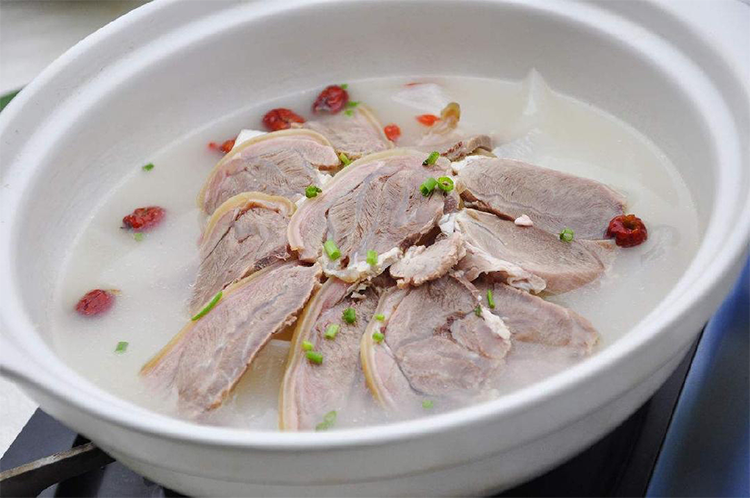Jianyang Mutton Soup: Sichuan Winter Comfort
1. Origin and History
Jianyang Mutton Soup traces its roots back over two thousand years to the Han Dynasty. According to local legend, General Zhang Liang once stationed his troops near Jianyang and ordered them to make a mutton stew to restore their strength during the harsh winter. Over generations, locals refined this simple military dish—removing its strong gamey flavor and enhancing it with regional spices and techniques—until it evolved into the fragrant, milky soup we know today. The dish’s ancient origin gives it a timeless character that continues to warm hearts and stomachs alike.
2. Cultural Significance
In Jianyang, Mutton Soup is more than food—it’s part of daily life and cultural identity. Locals see it as a winter tonic, saying, “A bowl of mutton soup keeps the cold and illness away.” For Jianyang natives living elsewhere, this soup represents home and family reunion. It also supports the local economy—from sheep farming to restaurants and food tourism—making it a proud symbol of Sichuan’s Bashu culinary heritage.
3. Key Ingredients
The soul of the soup lies in the local big-eared sheep, known for tender, evenly marbled meat with a clean aroma. Both meat and knuckle bones are used, simmered with a small bundle of herbs and warming spices like ginger, white angelica (Bai Zhi), sand ginger, and goji berries. These herbs don’t make the soup taste medicinal; they gently balance the flavor and remove any gamey notes, producing a rich yet delicate umami broth.
4. Preparation Method
The cooking process centers on slow simmering. Fresh mutton and bones are first boiled briefly to remove impurities, then rinsed and simmered gently for hours. Collagen and marrow slowly dissolve, turning the soup opaque and creamy white. Minimal seasoning ensures the natural sweetness of the lamb shines through, while the meat becomes tender enough to fall apart with a touch of chopsticks.

5. Flavor and Texture
A perfect bowl features an ivory-white broth with a light golden sheen. Its aroma combines the natural sweetness of mutton and faint herbal notes. The taste is full, mellow, and pure—no trace of unpleasant gaminess. The meat is silky and tender, almost melting in the mouth. On a chilly day, this soup offers warmth, comfort, and deep satisfaction.
6. How to Eat and Tasting Tips
Traditionally, the cooked mutton is cooled slightly, thinly sliced, and reheated briefly in the boiling broth. It’s served with condiments such as a chili dipping mix (ground dried chili, salt, and MSG), fresh cilantro, and chopped scallions. First, sip the plain broth to appreciate its natural flavor, then customize with chili or herbs to taste. Locals often enjoy it with rice or pickled vegetables, creating a perfect flavor balance.
7. Practical Tips for Visitors
For the most authentic Jianyang Mutton Soup, follow the locals to long-standing shops with big simmering pots by the door. Jianyang City has several time-honored restaurants favored by residents. Orders are often made by portion weight—choose mixed cuts for variety. The best season to enjoy the soup is autumn or winter, though many restaurants serve it year-round. Pair it with light pickles to balance the richness, and explore nearby attractions like Longquan Lake or Sanchahu to complete your cultural journey.
8. Simple Home Recipe
To make a home version, choose fresh leg or rib cuts with bones. Place them in cold water with ginger and a splash of cooking wine, bring to a boil, and skim thoroughly. Then rinse and simmer again in fresh water with ginger slices, scallion sections, and a small sachet of herbs (white angelica, star anise, or sand ginger). Simmer for 2–3 hours until the broth turns milky and the meat is tender. Skim excess fat, season with salt, and serve with cilantro, scallions, and a chili dipping mix.
9. Summary
Jianyang Mutton Soup is a creamy, historic lamb dish from Sichuan, born from Han-era traditions and perfected over centuries. Made with local big-eared sheep, gentle herbs, and slow simmering, it produces a rich, soothing broth that warms both body and spirit. For travelers seeking the authentic taste of Bashu cuisine, this iconic soup is an unmissable experience in Jianyang.


